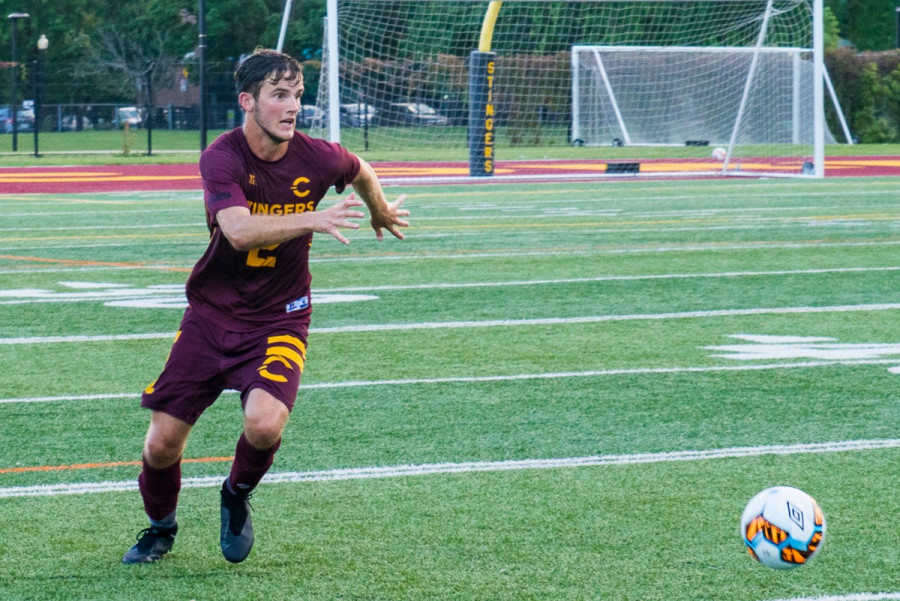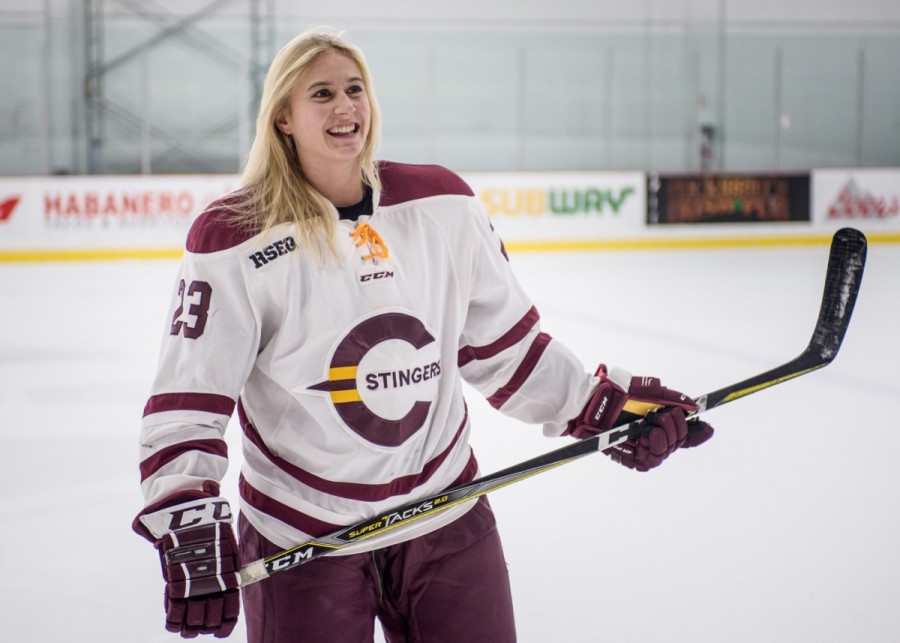The International Athletes of the Stingers
How a Lack of Options Brought European Athletes to Concordia
“Hockey where I lived is really not big at all. I really wanted to play at a normal level and back home I had to play with guys, and I really wanted to play with girls again,” said Bieke van Nes, one of Concordia’s newest women’s hockey players and one of only two players from outside of Canada on the team.
Van Nes, a Dutch native, had thought about going abroad again after spending time back home in Amsterdam. She soon found herself in Canada, a familiar hockey country where she had previously spent a year playing with a team in Banff, Alberta.
“My friend played here on the hockey team as well and I really wanted to go abroad again,” said van Nes. “So I kind of through her got in contact with Julie [Chu] and Mike [McGrath] again and that’s how I ended up back here.”
The friend van Nes is referring to is Emily Even. She spent four seasons on defence with the Stingers women’s hockey team, from the 2013-2014 school year to the 2016-2017 one. The former Stinger is an Amsterdam native as well, and has spent a number of years in the Dutch national development program alongside van Nes.
“Bieke and I grew up playing against and with each other, so she approached me with the idea of potentially coming back to North America to continue to play competitive hockey.” said Even. “I had just graduated from Concordia and felt that her personality and character aligned well with the culture coach Chu and McGrath were implementing.”
Knowing that Even was familiar with Concordia’s program and recommended it, having had a positive experience living in Canada previously was enough to convince van Nes to make the jump. Now she finds herself a U Sports athlete on one of the top teams in the country.
“I think it’s going really well,” she said. “This year we have a big rookie class, so that kind of makes the dynamic between veterans and rookies a bit blurred because half the team [are] rookies. Plus everyone is really making the effort to make everyone feel included, it’s just the spirit and the team-first mentality and the inclusion of everyone, even if you’re from Europe. I think that’s going to translate on the ice as well.”
Van Nes said that she’s been really enjoying her time at Concordia this season. One of the main reasons Canada and university sports were a big draw for her when deciding to go abroad again was the opportunity to continue her studies while playing at an elite level, something uncommon in her home country.
“I really like the atmosphere here and the fact that it’s school and sports combined,” she explained. “If I wanted to play with girls I could have done that in Europe as well, but I really wanted to continue studying and playing my sport, and the fact that in North America it’s really school and sports intertwined, we don’t find that in Europe.”
Something that can be noted about North American university athletics is that the possibilities are nearly endless in terms of options for athletes of all levels, and elite athletes in particular, in terms of schools to go to and teams to play for. Nowhere in Europe can you find as many nationally and internationally recognized varsity programs as are offered in Canada and the United States.
Of course, it is possible for an athlete to compete in their sport while working towards a secondary education in Europe, but options are slim on campus and high-level athletes are often forced to look elsewhere for elite programs to partake in.
“I really wanted to continue studying and play my sport, and the fact that in North America it’s really school and sports intertwined, we don’t find that in Europe.”— Bieke van Nes
“Athletics and school are often two separate entities, which makes balancing the two more complicated,” said Even. “On top of that, athletics are significantly better funded in North America than in Europe. The overall athlete culture is accessible from a young age, whereas athletes in Europe need to invest a lot of their own time, effort and money to even be able to play.”
In Canada, elite level athletics and quality education live in harmony by allowing athletes to succeed in their sport and in their academic endeavours, making it a very attractive option for young athletes looking to study and compete abroad. Not to mention the wealth of resources for young athletes when it comes to mentorship.
Concordia’s women’s hockey team in particular boasts an impressive roster of coaches.Head coach Julie Chu, the former captain of team USA is backed by Caroline Ouellette, former team Canada captain, each of whom have multiple Olympic medals to their name. The Stingers coaching staff also includes a number of current and former Canadian Women’s Hockey League pro players.
The opportunities for athletes when their time as a student is up are plentiful in North America.
While not everyone is guaranteed a professional contract at the end of their university eligibility, U Sports and the NCAA often serve as stepping stones to semi professional or professional careers. A number of Stingers have gone on to play professionally, especially women’s hockey players. In the last few years, three Stingers have been drafted to Les Canadiennes de Montreal in the CWHL draft: including former captains Tracy-Ann Lavigne in 2017 as well as Marie-Joëlle Allard and Caroll-Ann Gagné in 2018.
Despite being happy with her decision to come to Canada, van Nes acknowledges that moving halfway across the world was no easy task.
“Obviously moving countries is a big step, there’s a lot to think about and a lot to take care of,” she said. She also explained that while she sometimes feels homesick, she thinks of it as less of missing home in the physical sense.
“[It’s not] home itself,” she said. “I used to move around a lot when I was a kid in general so really, not like a specific home but my family and my friends, I‘d like to see them.”
Van Nes’ fellow Stinger Stijn Kruidenier, also a Dutch native, has found himself in a similar situation to van Nes. As a member of Concordia’s men’s soccer team for the past two seasons, the marketing masters student at the John Molson School of Business has spent a number of years travelling the world as both a student and an athlete.
Moving from place to place as a child for his father’s career, Kruidenier said he caught the travel bug and it just stuck with him. He was born in Amsterdam, and has lived or studied in the United States, Switzerland, Belgium and the United Kingdom.
“The younger part of my life was mainly due to my parents, but I guess it kind of got built into me that I like adventuring a little bit,” he explained.
Prior to committing to Concordia for his graduate studies, Kruidenier earned bachelor’s degrees from Nyenrode New Business School in Amsterdam and Westminster University in the UK. After finishing, Kruidenier decided he wanted to move west. Like van Nes, he moved to Canada with the hopes of
obtaining a degree while continuing to play soccer at a high level.
“I came to Canada just because I wanted to play soccer and in Europe you can’t play soccer and study at the same time, it’s not very well coordinated,” he said.
For the past two seasons, Kruidenier has settled into life in Montreal, and as a member of Concordia’s men’s soccer team. Despite the team’s less than stellar record over his two seasons with the program, Kruidenier said he’s really enjoyed his experience.

As the marketing student prepares to finish his degree and graduate at the end of this school year, he’s contemplated staying in Montreal or somewhere else in Canada.
“That’s still to be determined,” he chuckled.
For now, van Nes is here to stay as she finishes up her masters. Living away from home and playing with the Stingers in Montreal, van Nes still remains connected to her birth country as a member of the Dutch national women’s hockey team. The young forward has represented the Netherlands in seven consecutive International Ice Hockey Federation Women’s World Championships, and participated in the Olympic Games qualification for the 2018 Winter
Olympics held in Pyeongchang, South Korea.
She plans to continue representing her country while completing her degree at Concordia, something she said is common among many of her teammates on Team Netherlands.
“A lot of the girls on our team right now actually play abroad because like I said hockey back home is really small,” she said. “There’s a lot of girls on our team who branch out, in Europe mostly, like Scandinavia, Sweden. We have Worlds in April so that’s right after the season ends so it lines up perfectly.”
During her time here with the Stingers, she puts in her own hours in the gym training in anticipation of the upcoming World Championships; her teammates do the same with their respective club teams. Over the holiday break, van Nes joined her Team Netherlands teammates on home turf where they had the chance to regroup and train as a team.
“Usually that’s how we group together, and then a couple weeks before Worlds we have training as well,” she said. “For a national team that’s kind of always the case though, you can’t always train as intensively with that team as we do here [at Concordia].”
Van Nes also mentioned that a more long term stay in Montreal or Canada might be in her plans, but since she still has two years to work towards her degree, that’s a conversation for another day.
“It depends, because after this I’m done studying and I’m not going to do another masters or anything,” she said. “I’m going to spend the next two years here and then I’m going to have to get a job. Maybe I’ll get a job around here, and the chances are bigger that I find a job here rather than back home. So maybe I’ll stick around. I really like Canada, it’s just so much fun here.”




4_600_375_90_s_c1.jpg)
_600_375_90_s_c1.jpg)
_600_375_90_s_c1.jpg)
